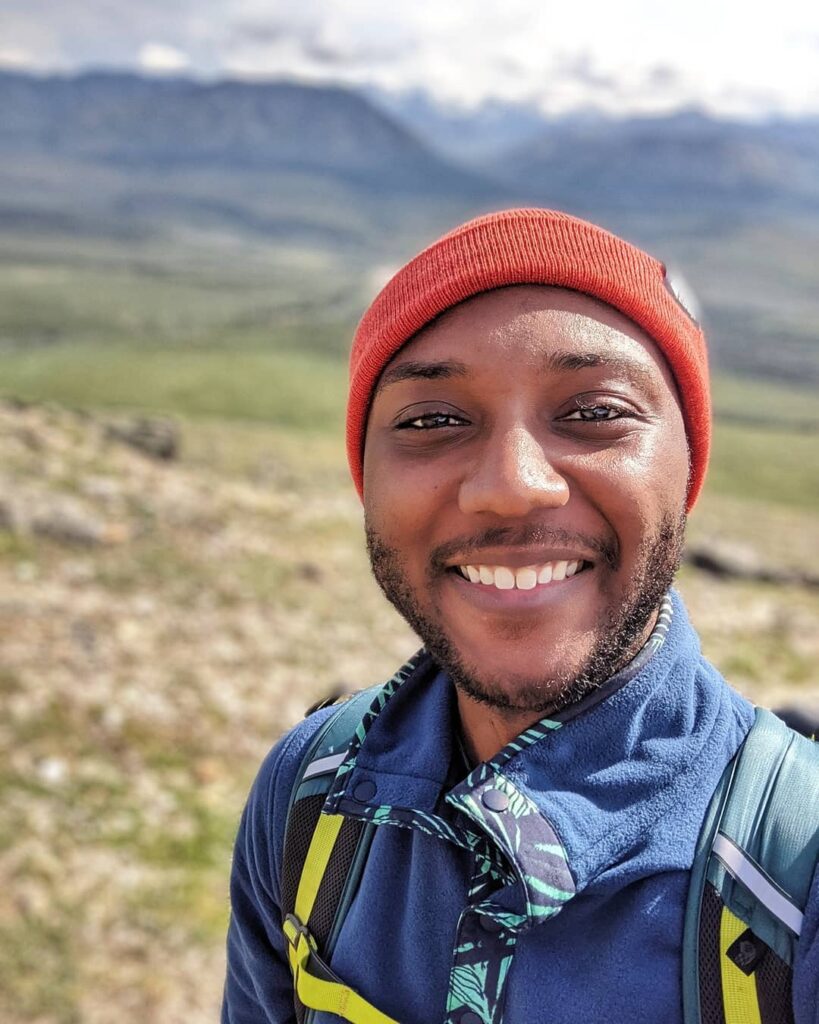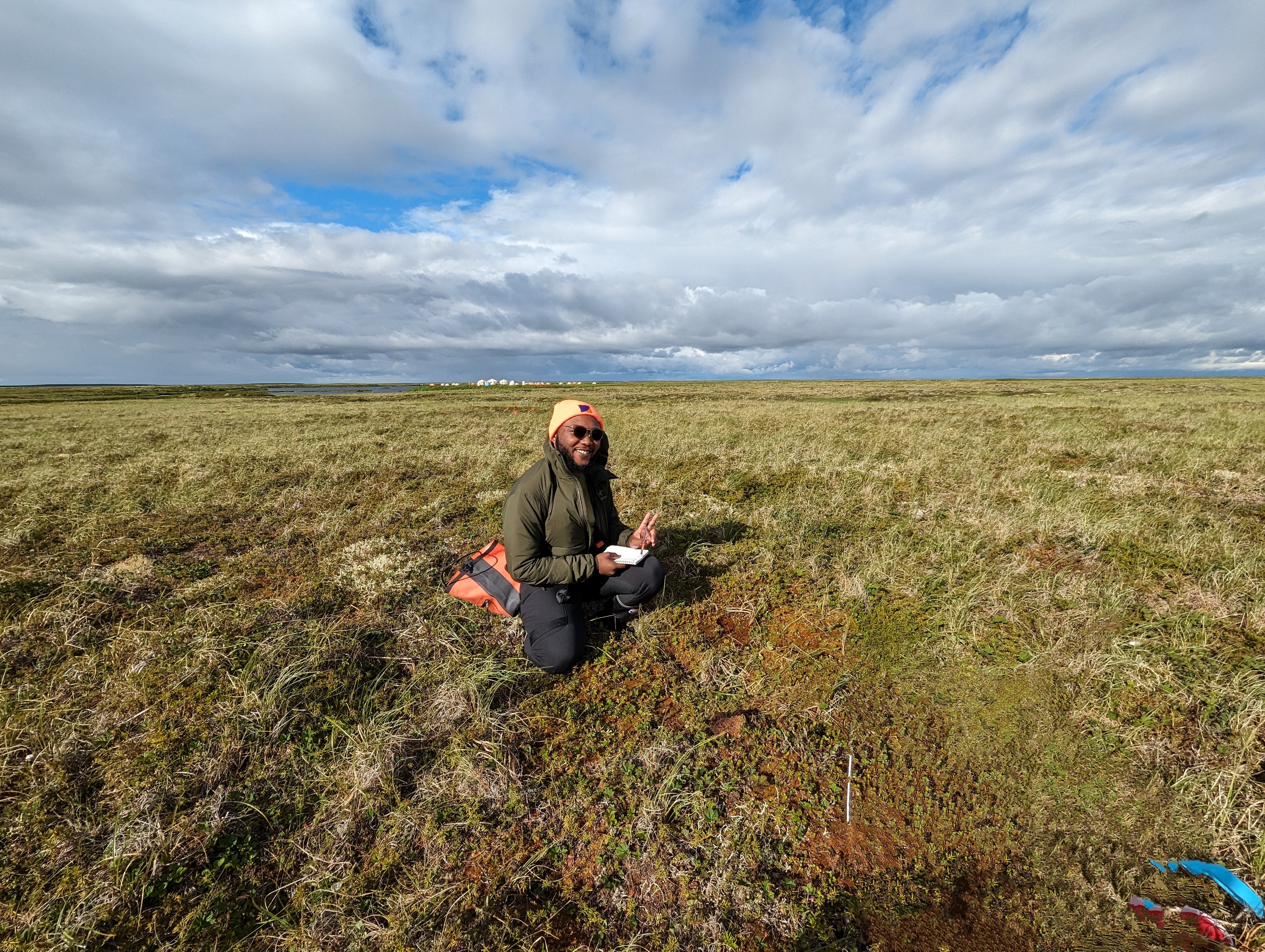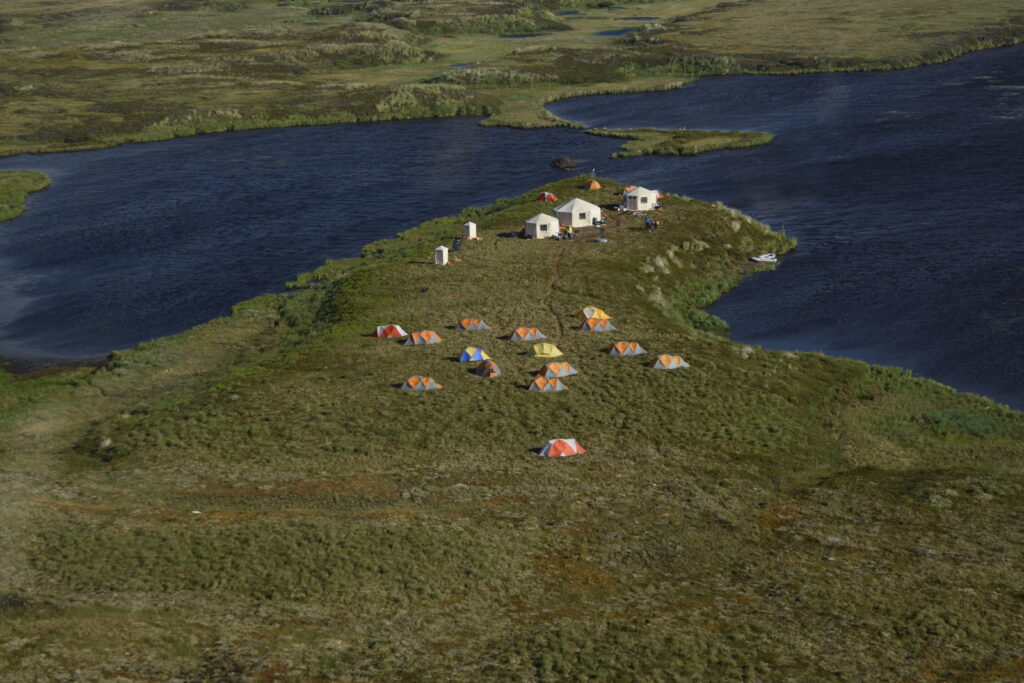As a part of the Western Collaborative Conservation Network, the Emerging Leadership Initiative works to support individuals by connecting them with mentors, one another, and resources that create career and professional development opportunities and empower change.
“Emerging leaders” are individuals new to the conservation field with an innovative vision for the future of conservation work and the motivation, passion, and collaborative mindset to work toward that vision. In this profile series, we’re featuring some of these emerging leaders to hear about their passions, the challenges they’ve faced entering the field of collaborative conservation, and their ideas for the future.
To find out more about the Emerging Leadership Initiative, contact Jessica Archibald.
We had the pleasure of speaking with Dr. Nigel Golden (he/his), a Postdoctoral Researcher and Expedition Leader with the Polaris Project at Woodwell Climate Research Center. Nigel describes his experiences as a Black, Queer man in the STEM field, stresses the importance of Diversity, Equity, Inclusion, and Justice (DEIJ) in conservation and science, defines “Brave Leadership”, and describes his journey to becoming an arctic climate scientist.
Written by Audrey Clavijo
—

Nigel Golden’s entry into the field of conservation and what he calls a ‘positive obsession with the outdoors and our non-human relatives’ all started though the screen of a television. “Shows like the Magic School Bus, Planet Earth, and Crocodile Hunter absolutely captivated me,” Nigel says. Like many People of Color and other marginalized communities who have limited access to nature, Nigel’s love and appreciation for the outdoors wasn’t guided by familial experiences in natural areas. “My family didn’t really have this sort of connection with the outdoors or even loosely with conservation,” explains Nigel, “I experienced scarcity in this facet but what I had in abundance was imagination and a community that held me accountable to envision the things that I sought for myself.”
Motivated by his community and inspired by the scientists he looked up to on TV, Nigel pursued a double major in Biology and Wildlife Ecology Research and Management at University of Wisconsin Stevens Point. Despite being intentional about cultivating a supportive community and being incredibly involved on campus– participating in Black Student Union, co-creating a local chapter of MANRRS (Minorities in Agriculture, Natural Resources, and Related Sciences) and conducting research with Wildlife Professor Dr. Shelli Dubay– Nigel says in many settings it was distressing to be the only Person of Color. Regrettably, Nigel’s sentiment is not unique. Numerous studies recognize the disadvantages and limitations of BIPOC (Black, Indigenous, People of Color) community members in the pursuit of STEM (Science, Technology, Engineering, and Mathematics) graduate education and careers.
In 2012, Nigel participated in an undergraduate research experience via the Woods Hole Partnership Education Program (PEP): a 10-week program which provides students with marginalized identity markers practical experience in conducting environmental science research between the six Woods Hole scientific institutions. The PEP research experience motivated Nigel to apply to the Woodwell Climate Research Center’s Polaris Project, an undergraduate research program with the goal to advance Arctic science and to increase diversity of Arctic scientists. Alongside a dozen other young scientists, Nigel traveled to northeastern Siberia to research zoo-geomorphic/geochemistry impacts of the carbon cycle. More specifically, Nigel studied how Arctic ground squirrel burrowing activities affect permafrost carbon release. He says, “the close proximity to the subject matter, being in the field, and lacking access to the internet, genuinely facilitated an immersive experience of science and the development of a community.”

Nigel describes his summer in Siberia with the Polaris Project as the most formative experience in which he saw himself as a scientist. “No longer was I just seeing this on the TV, I was out in the Arctic doing research. It was this experience that further steered me to graduate school.”
Nigel went on to complete a PhD in Environmental Conservation at University of Massachusetts Amherst. His doctoral research centered on arctic ground squirrels, analyzing the impacts of climate change on squirrel population and distribution in interior Alaska’s Denali National Park. While in graduate school, Nigel persisted in advocating for Diversity, Equity, Inclusion, and Justice (DEIJ) by participating in campaigns highlighting sexual harassment of women in the STEM field and co-founding a program to increase seminar speaker diversity.
Before completing his degree, Woodwell Climate Research Center recruited Nigel for a full time position. Now, Nigel works as a Postdoctoral Researcher at Woodwell Climate Research Center and will soon be the Principal Investigator of the annual summer Polaris Project research experience. He continues to promote values and frameworks of DEIJ in the work that he does at Woodwell and the Polaris Project. He says that collaborating with students from marginalized backgrounds has deepened his evaluation of his personal pedagogy, teaching philosophy, as well as his role in cultivating supportive culture and community in the field.
In addition to leading the Polaris Project, Nigel collaborates with a variety of climate research project partners to better understand the impacts of climate change on the Arctic environment and communities. Currently, Nigel is working with Alaska Native communities to study permafrost thaw and to co-develop equitable community-driven adaptation strategies. “This is the aspect of the work that calls to me the most,” says Nigel, “empowering Indigenous science and more broadly, marginalized groups, not only in the production of climate science but conservation as well.”
I asked Nigel what he thinks about the term “Emerging Leadership” and what qualities he feels embodies the term. “My friends use a different term,” Nigel explains, “Brave Leadership, which requires reflexivity and self assessment: What are the things that I self-embody? Does the work that I am doing, the communities I am building, and the ways I am interacting with others align with my values? Are the ways that I am showing up in line with the principles of diversity, inclusivity, equity and justice? Am I showing up in such a way to reduce harm in the communities where I am working? I think this is one of the critical components of being an emerging leader: reflexivity and self assessment. And it’s a life-long journey.”
Nigel is inspired by colleagues, role models, and strangers who are committed to integrating DEIJ principles as a core component of their scientific identities and leadership styles. He aspires for these endeavors, along with acknowledging the contributions of People of Color, to ultimately foster a more inclusive, accessible, and open conservation and teaching environment.
One challenge, Nigel describes, is access to the scientific data used to influence policy recommendations and guidelines. Closed data sources reduce opportunities for other scientists to reproduce research and compare results and trends across landscapes. Furthermore, Nigel asserts that it impedes progress towards empowering communities through science. Openly accessible research data can support community advocacy efforts and empower communities to be active participants in decision-making processes that affect them.
When I asked Nigel what he sees for his future, he thinks for a moment. “I don’t need to be called to give expert testimonies in front of a science panel for Congress. I want my work to happen and be co-produced with the communities in which that research is embedded. I want that research to empower the communities and I want the communities to feel like they can take ownership over that research as well. I’m not exactly there yet, but this is where I want to go.”
—
If you are an undergraduate student interested to learn more about the Polaris Project application process and field experience, click here.


